初中七年级的一般现在时及现在进行时讲解与习题.docx
(完整版)初中语法一般现在时和现在进行时讲解、练习含答案

一般现在时:一、定义与讲解:一般现在时表示经常或习惯性的动作或一般性事实。
,也可表示现在的状态或主语具备的性格和能力。
通常与副词every day(每天),always(总是),usually(通常),often (经常)sometimes(有时),等时间状语连用。
例:(1)表示事物或人物的特征、状态。
The sky is blue.天空是蓝色的。
Mary’s father is an English teacher. 玛丽的爸爸是一名英语老师。
(2)表示经常性或习惯性的动作。
I get up at six every day.我每天六点起床。
She plays sports every day. 她每天都做运动。
(3)表示客观现实。
The table has four legs.桌子有四条腿。
There are 50 students in my class. 我们班有50个学生。
(4)表示客观真理,科学原理,自然现象,等客观事实或格言谚语等。
The sun rises in the east every day.太阳每天从东方升起。
The earth goes around the sun.地球绕着太阳转。
(5)表示平日的喜好。
I like bananas. We don’t like vegetables.He likes ice cream. She doesn’t like strawberries.二.只有主语在第三人称单数时用动词的“三单形式”,其他人称用动词原形。
★动词三单形式的变化规则:1.(1)多数直接在动词词尾加-s.play — plays like — likesask---asks work---works get---gets call---calls(2)以字母s, x, ch, sh或o结尾的动词,在词尾直接加-es.watch---watches wish---wishes do---does go---goes (3)以“辅音字母加 - y”结尾的动词,要先变y为i再加-es.try---tries study---studies cry---cries fly---flies2.不规则变化:be---- is have----has三、一般现在时的句子转换:(1)变一般疑问句:当句子中有be动词或情态动词时,则把be动词或情态动词(can,could等)提到主语的前面,(口诀:一调二变三问号);(2)变否定句:在be动词或情态动词后面直接加not变成否定句. (be后not 莫忘记)例:①陈述句:She is my sister..疑问句→ Is she your sister? Yes, I am./ No, I’m not.否定句→ She is not my sister.②陈述句:I can play soccer.疑问句→ Can you play soccer? Yes,Ican./ No, I can’t.否定句→ I can not /can’t play soccer.★注意:对一般疑问句的回答:一般用什么问就用什么来回答。
一般现在时、现在进行时讲解及练习MicrosoftWord文档

一般现在时、现在进行时讲解及练习MicrosoftWord文档一般现在时态一、一般现在时的定义一般现在时是表示现在经常反复发生的动作,存在的状态或习惯性的动作的时态。
二、一般现在时的结构一般现在时用行为动词的原形,但第三人称单数作主语时,动词的词尾要加-s 或- es。
现在以连系动词be 和行为动词read为例,对一般现在时的肯定句、否定句、疑问句及其简略答语的构成以表格形式加以说明:动词肯定句否定句be I am …I am not …You/We/They are …You/We/They are not …He/She/It is ... He/She/It is not …read I/We/You/They read…I/We/You/They/ do notread …He/She/It reads …He/She/It does not read …动词疑问句简略答语(肯定)简略答语(否定)be Am I …?Yes , you are. No, you are not. Are you …?Yes, I am/we are. No, I am/we are not. Are we …?Yes, we/you are. No, we/ you are not. Are they …?Yes, they are. No, they are not.Is he…?Yes, he is. No, he is not.Is she …?Yes, she is. No, she is not.Is it …?Yes, it is. No, it is not.read Do I / we / theyread …?Yes, you / we /they do.No, you / we / theydo not.Does he / she / itread … ?Yes, he / she / itdoes.No, he / she / it doesnot.连系动词be 的各种形式常与代词或not缩写成一个词。
(word完整版)初一现在进行时讲解练习及答案.doc
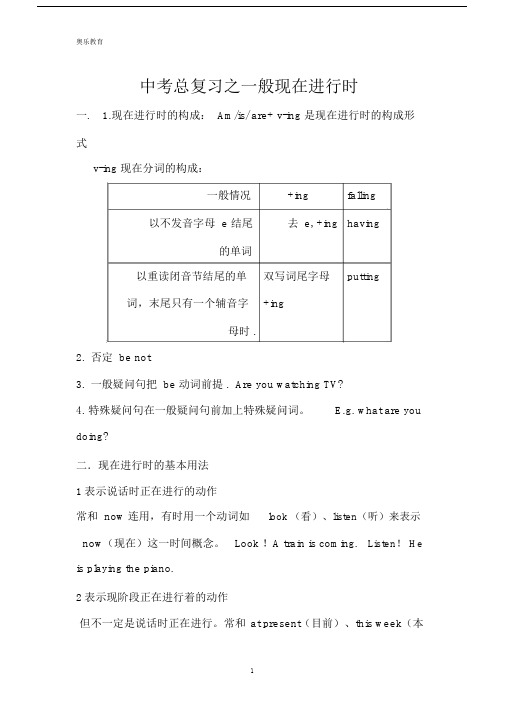
中考总复习之一般现在进行时一. 1.现在进行时的构成: Am/is/ are+ v-ing 是现在进行时的构成形式v-ing 现在分词的构成:一般情况+ing falling以不发音字母 e 结尾去e, +ing having的单词以重读闭音节结尾的单双写词尾字母putting词,末尾只有一个辅音字+ing母时 .2.否定 be not3.一般疑问句把 be 动词前提 . Are you watching TV?4. 特殊疑问句在一般疑问句前加上特殊疑问词。
E.g. what are you doing?二.现在进行时的基本用法1表示说话时正在进行的动作常和 now 连用,有时用一个动词如look (看)、listen(听)来表示now(现在)这一时间概念。
Look !A train is coming.Listen! He is playing the piano.2表示现阶段正在进行着的动作但不一定是说话时正在进行。
常和at present(目前)、this week(本周)、these days(这几天)等时间状语连用。
What lesson are you studying this week?(说话时并不在学)3现在进行时有时可用来表示一个在最近按计划或安排要进行的动作即是说可以用来代替将来时,但此时,一般要与表示将来的时间状语连用,而且仅限于少量动词。
如: go(去)、come(来)、leave(离开)、start (开始)、arrive(到达)、return(返回)、sleep(睡觉)、Are you going to Tianjing tomorrow ?How many of you are Coming to the party next week?4be going to+动词原形这一句型表示即将发生的事或打算(准备)做的事,我们把它归在将来时里了。
she isn't going to speak at the meeting.注意:如果没有表示将来时间的状语,此类句子就可能指现在或现阶段的动作。
初一英语一般现在时与现在进行时区别完形填空题20题答案解析版

初一英语一般现在时与现在进行时区别完形填空题20题答案解析版1**题干**:My school life is very interesting. I usually get up at seven o'clock in the morning. Then I have breakfast and go to school. I have many classes every day. In the classroom, we are often listening to the teacher carefully. After class, we sometimes play games on the playground. At noon, I have lunch in the cafeteria. In the afternoon, we continue to have classes. Sometimes we are having group discussions. After school, I go home and do my homework.**问题1**:In the classroom, we are often ____ to the teacher carefully.A. listenB. listensC. listeningD. listened答案:C。
现在进行时be doing 结构,表示正在进行的动作。
A 选项listen 是一般现在时;B 选项listens 是一般现在时第三人称单数形式;D 选项listened 是一般过去时。
此处强调在教室里我们正在认真听老师讲课,所以用listening。
**问题2**:After class, we sometimes play games on the playground. This sentence is in ____ tense.A. present continuousB. present simpleC. past continuousD. past simple答案:B。
(word完整版)初一一般现在时讲解及其练习

初一英语一般现在时讲解及其练习1定义:表示通常性、规律性、习惯性的状态或者动作(有时间规律发生的事件)的一种时间状态。
2基本结构A.如果谓语动词是实义动词的结构结构:肯定式:主语+动词原形/动词的第三人称单数否定式:主语+助动词don't/doesn't +动词原形+其他疑问式:Do/Does+主语+动词原形+其他简略回答:(肯)Yes,主语+do/does (否)No,主语+do/does not缩写形式: don't == do not doesn't ==does not注意:have的第三人称单数为has1)be动词的第一人称单数为am,第三人称单数为is,其他人称为areBe动词顺口溜用法:我用am ,你用are ,is 用于他,她,它, 单数is,复数are.肯定式:主语+ am /is/are +其他否定式:主语+ am/is/are +not + 其他疑问式:Am /Is /Are + 主语+ 其他?简略回答: (肯) Yes,主语+ am/ is /are (否) No,主语+ am /is/are not缩写形式: I'm == I am That's ==That is We're ==We are What's== What isYou're == You are Who's == Who is They're ==They are Where's ==Where is He's==He is She's =She is It's == It is isn't==is not aren't==are not疑问句型写出下列动词的第三人称单数:study play go come help teach lie listen begin open sit wash guess cut run eat B 助动词a. 基本助动词be (是) - am, is, areI 用am ;she/he/it, 名词单数都用is ;we, you, they, 名词复数都用areb. 基本助动词have (有) - have, hasI, we, you, they, 名词复数都用have ;she/he/it is, 名词单数都用hasc. 基本助动词do-do doesI, we, you, they, 名词复数都用do ;she/he/it is, 名词单数都用doesd.情态助动词,不论单复数、不论什么人称都没有变化,都用can, may 等。
完整word版-初中一般现在时用法及练习
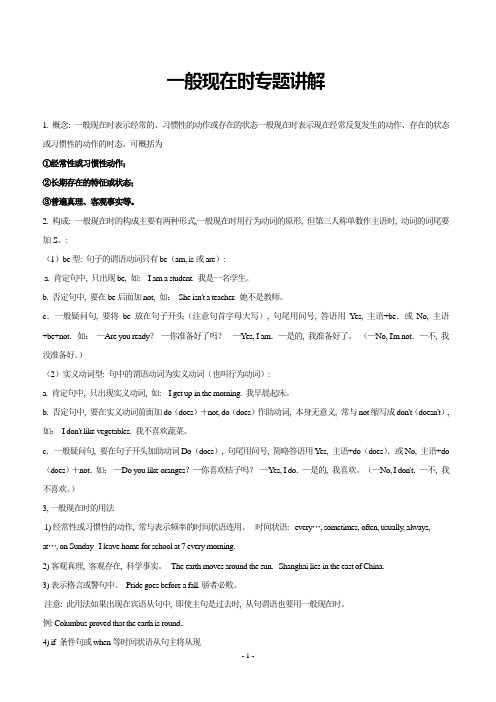
一般现在时专题讲解1. 概念: 一般现在时表示经常的、习惯性的动作或存在的状态一般现在时表示现在经常反复发生的动作、存在的状态或习惯性的动作的时态。
可概括为①经常性或习惯性动作;②长期存在的特征或状态;③普遍真理、客观事实等。
2. 构成: 一般现在时的构成主要有两种形式,一般现在时用行为动词的原形, 但第三人称单数作主语时, 动词的词尾要加-S。
:(1)be型: 句子的谓语动词只有be(am, is或are):a. 肯定句中, 只出现be, 如: I am a student. 我是一名学生。
b. 否定句中, 要在be后面加not, 如: She isn't a teacher. 她不是教师。
c.一般疑问句, 要将be放在句子开头(注意句首字母大写), 句尾用问号, 答语用Y es, 主语+be.或No, 主语+be+not.如:—Are you ready?—你准备好了吗?—Y es, I am.—是的, 我准备好了。
(—No, I'm not.—不, 我没准备好。
)(2)实义动词型: 句中的谓语动词为实义动词(也叫行为动词):a. 肯定句中, 只出现实义动词, 如: I get up in the morning. 我早晨起床。
b. 否定句中, 要在实义动词前面加do(does)+not, do(does)作助动词, 本身无意义, 常与not缩写成don't(doesn't), 如: I don't like vegetables. 我不喜欢蔬菜。
c.一般疑问句, 要在句子开头加助动词Do(does), 句尾用问号, 简略答语用Y es, 主语+do(does).或No, 主语+do (does)+not.如:—Do you like oranges?—你喜欢桔子吗?—Y es, I do.—是的, 我喜欢。
(—No, I don't.—不, 我不喜欢。
初中英语时态讲解及练习(全)

时间状语:Tomorrow, next day(week, month, year…),soon, in a few minutes, by…,the day after tomorrow, etc.
否定形式:主语+am/is/are not going to do ; 主语+will/shall not do+其他 一般疑问句:be放于句首;will/shall提到句首。
1.I ____(write, am writing, is writing, are writing) a letter now. 2.Look, it _____(begin, is beginning, am beginning, are beginning) to rain. 3.They ____(study, is studying, am studying, are studying) medicine at the Medical Institute of Chengde these days. 4.He _____(teach, am teaching, is teaching, are teaching) an English lesson at this time.
谓语动词使用过去式形式, 加ed,分为规则和不规则变 化。表示过去经常发生的动 作,也可用“used to do ” 和“would +动词原形”。
1. He____(be, was, were, been) here a moment ago. 2. They ____(be, was, were, been) here just now. 3. The scientists _____(leave, leaves, leaved, left) for America yesterday. 4. Last week we ______(visit, visited ) the Science Museum. 5. When I was a child, I often ____(play, played) football. 6. The students ran out of the classroom as soon as the bell ____(ring, rang, rung).
初中一般现在时+现在进行时+一般过去时讲解+练习
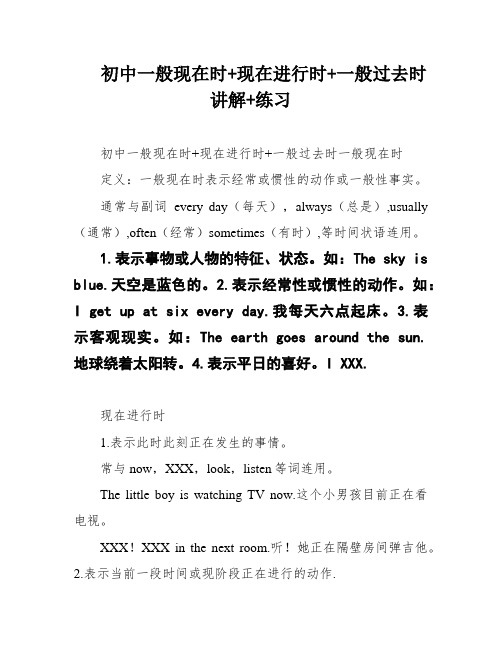
初中一般现在时+现在进行时+一般过去时讲解+练习初中一般现在时+现在进行时+一般过去时一般现在时定义:一般现在时表示经常或惯性的动作或一般性事实。
通常与副词every day(每天),always(总是),usually (通常),often(经常)sometimes(有时),等时间状语连用。
1.表示事物或人物的特征、状态。
如:The sky is blue.天空是蓝色的。
2.表示经常性或惯性的动作。
如:I get up at six every day.我每天六点起床。
3.表示客观现实。
如:The earth goes around the sun.地球绕着太阳转。
4.表示平日的喜好。
I XXX.现在进行时1.表示此时此刻正在发生的事情。
常与now,XXX,look,listen等词连用。
The little boy is watching TV now.这个小男孩目前正在看电视。
XXX!XXX in the next room.听!她正在隔壁房间弹吉他。
2.表示当前一段时间或现阶段正在进行的动作.此时有thisweek,XXX等时间状语连用I am studying computer this term.这个学期我一直在研究计算机。
3.表示在近期按计划或安排要发生的动作。
(现在进行时表示一般将来)I am XXX.我将要离开了。
An XXX.今天下午一位美国教授将要作报告。
4.以look,listen开首的句子,提醒我们举措正举行,这时候要用目前举行时。
XXX!She is XXX听,她正在唱英语歌。
一般过去时1)透露表现曩昔某个特定工夫产生的举措或存在的状况常有明确的时间状语,如yesterday,lastnight,someyearsago,XXX't come to class XXX.XXX本日没来上课。
XXX.昨晚我们去跳舞了。
(2)表示过去的惯性或经常发生的动作常与often,usually,seldom等透露表现频度的副词连用。
初中一般现在时与现在进行时语法详解及习题
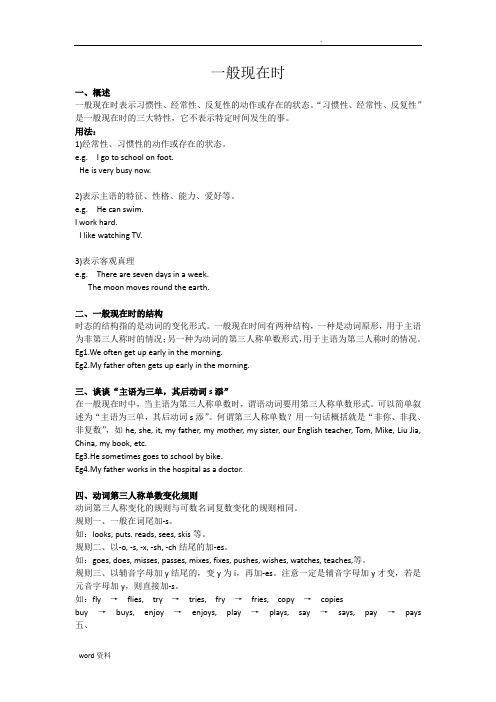
一般现在时一、概述一般现在时表示习惯性、经常性、反复性的动作或存在的状态。
“习惯性、经常性、反复性”是一般现在时的三大特性,它不表示特定时间发生的事。
用法:1)经常性、习惯性的动作或存在的状态。
e.g. I go to school on foot.He is very busy now.2)表示主语的特征、性格、能力、爱好等。
e.g. He can swim.I work hard.I like watching TV.3)表示客观真理e.g. There are seven days in a week.The moon moves round the earth.二、一般现在时的结构时态的结构指的是动词的变化形式。
一般现在时间有两种结构,一种是动词原形,用于主语为非第三人称时的情况;另一种为动词的第三人称单数形式,用于主语为第三人称时的情况。
Eg1.We often get up early in the morning.Eg2.My father often gets up early in the morning.三、谈谈“主语为三单,其后动词s添”在一般现在时中,当主语为第三人称单数时,谓语动词要用第三人称单数形式。
可以简单叙述为“主语为三单,其后动词s添”。
何谓第三人称单数?用一句话概括就是“非你、非我、非复数”,如he, she, it, my father, my mother, my sister, our English teacher, Tom, Mike, Liu Jia, China, my book, etc.Eg3.He sometimes goes to school by bike.Eg4.My father works in the hospital as a doctor.四、动词第三人称单数变化规则动词第三人称变化的规则与可数名词复数变化的规则相同。
规则一、一般在词尾加-s。
初中语法一般现在时和现在进行时讲解练习含答案
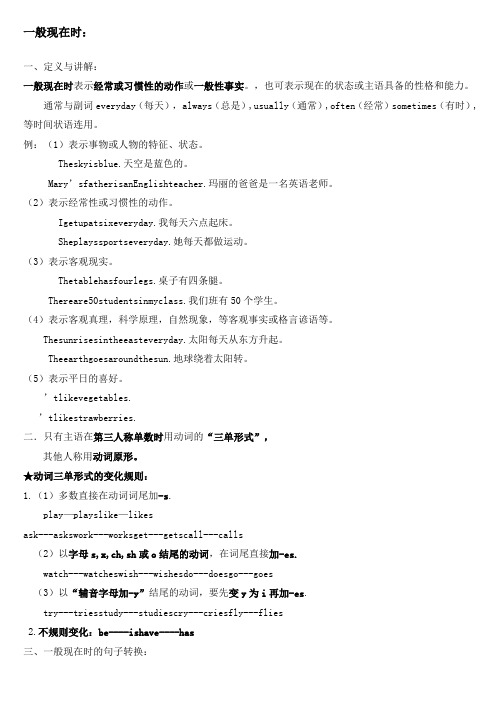
一般现在时:一、定义与讲解:一般现在时表示经常或习惯性的动作或一般性事实。
,也可表示现在的状态或主语具备的性格和能力。
通常与副词everyday(每天),always(总是),usually(通常),often(经常)sometimes(有时),等时间状语连用。
例:(1)表示事物或人物的特征、状态。
Theskyisblue.天空是蓝色的。
Mary’sfatherisanEnglishteacher.玛丽的爸爸是一名英语老师。
(2)表示经常性或习惯性的动作。
Igetupatsixeveryday.我每天六点起床。
Sheplayssportseveryday.她每天都做运动。
(3)表示客观现实。
Thetablehasfourlegs.桌子有四条腿。
Thereare50studentsinmyclass.我们班有50个学生。
(4)表示客观真理,科学原理,自然现象,等客观事实或格言谚语等。
Thesunrisesintheeasteveryday.太阳每天从东方升起。
Theearthgoesaroundthesun.地球绕着太阳转。
(5)表示平日的喜好。
’tlikevegetables.’tlikestrawberries.二.只有主语在第三人称单数时用动词的“三单形式”,其他人称用动词原形。
★动词三单形式的变化规则:1.(1)多数直接在动词词尾加-s.play—playslike—likesask---askswork---worksget---getscall---calls(2)以字母s,x,ch,sh或o结尾的动词,在词尾直接加-es.watch---watcheswish---wishesdo---doesgo---goes(3)以“辅音字母加-y”结尾的动词,要先变y为i再加-es.try---triesstudy---studiescry---criesfly---flies2.不规则变化:be----ishave----has三、一般现在时的句子转换:(1)变一般疑问句:当句子中有be动词或情态动词时,则把be动词或情态动词(can,could等)提到主语的前面,(口诀:一调二变三问号);(2)变否定句:在be动词或情态动词后面直接加not变成否定句.(be后not莫忘记) 例:①陈述句:Sheismysister..疑问句→IssheyoursisterYes,Iam./No,I’mnot.否定句→Sheisnotmysister.②陈述句:Icanplaysoccer.疑问句→CanyouplaysoccerYes,Ican./No,Ican’t.否定句→Icannot/can’tplaysoccer.★注意:对一般疑问句的回答:一般用什么问就用什么来回答。
初中一般现在时与现在进行时语法详解及习题
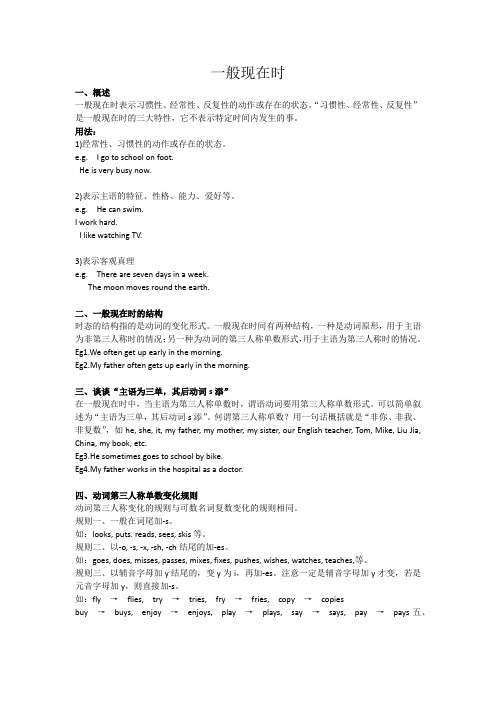
一般现在时一、概述一般现在时表示习惯性、经常性、反复性的动作或存在的状态。
“习惯性、经常性、反复性”是一般现在时的三大特性,它不表示特定时间内发生的事。
用法:1)经常性、习惯性的动作或存在的状态。
e.g. I go to school on foot.He is very busy now.2)表示主语的特征、性格、能力、爱好等。
e.g. He can swim.I work hard.I like watching TV.3)表示客观真理e.g. There are seven days in a week.The moon moves round the earth.二、一般现在时的结构时态的结构指的是动词的变化形式。
一般现在时间有两种结构,一种是动词原形,用于主语为非第三人称时的情况;另一种为动词的第三人称单数形式,用于主语为第三人称时的情况。
Eg1.We often get up early in the morning.Eg2.My father often gets up early in the morning.三、谈谈“主语为三单,其后动词s添”在一般现在时中,当主语为第三人称单数时,谓语动词要用第三人称单数形式。
可以简单叙述为“主语为三单,其后动词s添”。
何谓第三人称单数?用一句话概括就是“非你、非我、非复数”,如he, she, it, my father, my mother, my sister, our English teacher, Tom, Mike, Liu Jia, China, my book, etc.Eg3.He sometimes goes to school by bike.Eg4.My father works in the hospital as a doctor.四、动词第三人称单数变化规则动词第三人称变化的规则与可数名词复数变化的规则相同。
规则一、一般在词尾加-s。
(完整word版)七年级英语语法:一般现在时及练习
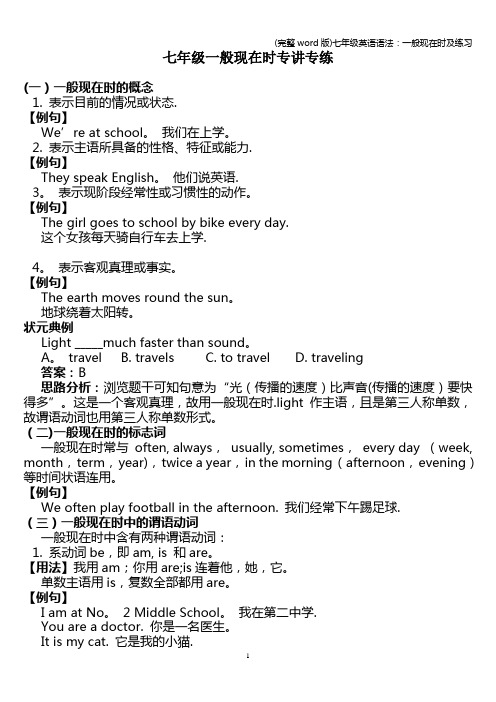
七年级一般现在时专讲专练(一)一般现在时的概念1. 表示目前的情况或状态.【例句】We’re at school。
我们在上学。
2. 表示主语所具备的性格、特征或能力.【例句】They speak English。
他们说英语.3。
表示现阶段经常性或习惯性的动作。
【例句】The girl goes to school by bike every day.这个女孩每天骑自行车去上学.4。
表示客观真理或事实。
【例句】The earth moves round the sun。
地球绕着太阳转。
状元典例Light _____much faster than sound。
A。
travel B. travels C. to travel D. traveling答案:B思路分析:浏览题干可知句意为“光(传播的速度)比声音(传播的速度)要快得多”。
这是一个客观真理,故用一般现在时.light作主语,且是第三人称单数,故谓语动词也用第三人称单数形式。
(二)一般现在时的标志词一般现在时常与often, always,usually, sometimes,every day (week, month,term,year),twice a year,in the morning (afternoon,evening)等时间状语连用。
【例句】We often play football in the afternoon. 我们经常下午踢足球.(三)一般现在时中的谓语动词一般现在时中含有两种谓语动词:1. 系动词be,即am, is 和are。
【用法】我用am;你用are;is连着他,她,它。
单数主语用is,复数全部都用are。
【例句】I am at No。
2 Middle School。
我在第二中学.You are a doctor. 你是一名医生。
It is my cat. 它是我的小猫.状元典例The boys _____ students.A。
(完整word版)初中一般现在时和现在进行时讲解及练习题
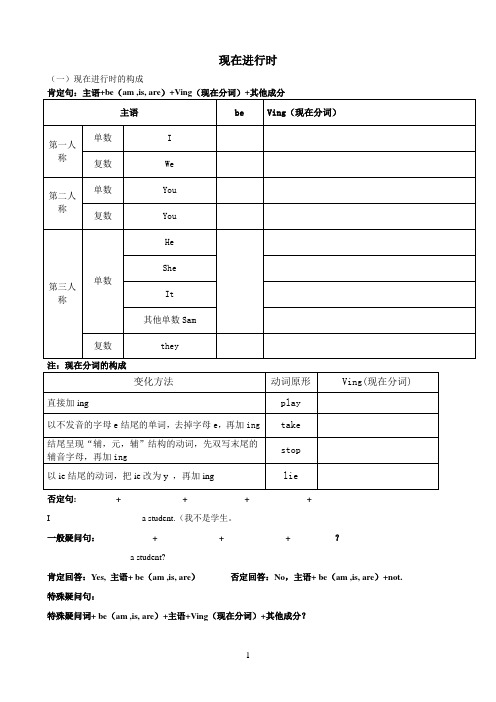
现在进行时(一)现在进行时的构成肯定句:主语+be(am ,is, are)+Ving(现在分词)+其他成分注:现在分词的构成否定句: + + + +I ________ __________ a student.(我不是学生。
一般疑问句:+ + + ?_________ _________ a student?肯定回答:Yes, 主语+ be(am ,is, are)否定回答:No,主语+ be(am ,is, are)+not. 特殊疑问句:特殊疑问词+ be(am ,is, are)+主语+Ving(现在分词)+其他成分?(二)不用于现在进行时的动词:1)表示事实状态的动词,如have, belong, possess, cost, owe, exist, include, contain, matter, weigh, measure, continue等。
I have two brothers. 我有两兄弟。
This house belongs to my sister. 这房子是我姐的。
2)表示心理状态的动词,如know, realize, think see, believe, suppose, imagine, agree, recognize, remember, want, need, forget, prefer, mean, understand, love, hate等。
I need your help. 我需要你的帮助。
He loves her very much. 他爱她很深。
3)瞬间动词,如accept, receive, complete, finish, give, allow, decide, refuse等。
I accept your advice. 我接受你的劝告。
4)系动词,如seem, remain, lie, see, hear, smell, feel, taste, get, become, turn等。
(完整版)初中一般现在时和现在进行时讲解、练习及答案.doc
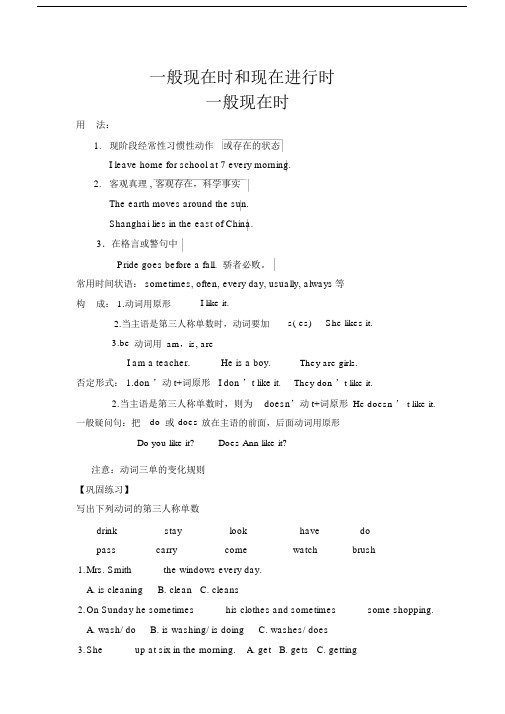
一般现在时和现在进行时一般现在时用法:1.现阶段经常性习惯性动作或存在的状态I leave home for school at 7 every morning.2.客观真理 , 客观存在,科学事实The earth moves around the sun.Shanghai lies in the east of China.3.在格言或警句中Pride goes before a fall. 骄者必败。
常用时间状语: sometimes, often, every day, usually, always等构成: 1.动词用原形I like it.2.当主语是第三人称单数时,动词要加-s(-es) She likes it.3.be 动词用am,is, areI am a teacher.He is a boy.They are girls.否定形式: 1.don ’动t+词原形I don ’t like it.They don ’t like it.2.当主语是第三人称单数时,则为doesn’动t+词原形He doesn ’ t like it. 一般疑问句:把do 或does 放在主语的前面,后面动词用原形Do you like it? Does Ann like it?注意:动词三单的变化规则【巩固练习】写出下列动词的第三人称单数drink ________ stay ________ look _________ have_______ do_________pass_______ carry ________ come________ watch______ brush________1. Mrs. Smith _____ the windows every day.A. is cleaningB. cleanC. cleans2. On Sunday he sometimes _____ his clothes and sometimes _____ some shopping.A. wash/ doB. is washing/ is doingC. washes/ does3. She _____ up at six in the morning. A. get B. gets C. getting现在进行时1.定:表示正在生或行的作构: be (am, is, are)+在分形式(写:be+-ing)A、述句 (肯定句 )主+ be(am, is, are)+在分,如:I am reading English.我正在英。
初中语法一般现在时,一般过去时,现在进行时(附答案).docx

一般现在时(1)表示经常或习惯性的动作。
⑵常与频率副词:never从来不seldom极少sometimes有时often经常usually 常常always 总是或every day 每天、in the morning / afternoon / evening 在早上/下午/晚上等连用。
(3)结构:①be型主语+be动词+其他。
表示主语的个性、特征或状态。
a.肯定句中,只出现be,如:I am a student.我是一名学生。
b・否定句中,要在be后面加not,如:She isn't a teacher.她不是教师。
c.一般疑问句,要将be放在句子开头(注意句首字母大写),句尾用问号,答语用Yes,主语+be.或No,主语+be+not.如:一Are you ready?一你准备好了吗?一Yes, I am.一是的,我准备好了。
(一No, Pm not.一不,我没准备好。
)②实义动词型主语+动词原形/动词第三人称单数s/es+其他。
表示经常性或习惯性的动作。
a.肯定句中,只出现实义动词,女口:I get up in the morning.我早晨起床。
b.否定句屮,在实义动词前而加do(does)+not, do(does)作助动词,本身无意义, 常与not 缩写成don'tCdoesn't),如:I don't like vegetables.我不喜欢蔬菜。
c.一般疑问句,要在句子开头加助动词Do(does),句尾用问号,简略答语用Yes,主语+do(does).或No,主语+do(does)+not.女口:一Do you like oranges?一你喜欢桔了吗?—Yes, Ido.—是的,我喜欢。
(—No, I don't.—不,我不喜欢。
(5) 一般现在时用行为动词的原形,但第三人称单数作主语时,动词耍用第三人称单数形式。
三单变化:①多数在动词后+s play 一plays like 一likesask■一asks work■一works get■一gets stay—stays②以字母s, x, ch, sh或o结尾的动词,在词尾直接加-es. watch-一watcheswish―wishes fix■一fixes do-一does go-一goes pass―passes③以“辅咅字母加・y”结尾的动词,要先变y为i再加-es. try—tries study■一studies cry—cries fly■一flies④不规则变化:be——is are have——has练习1.We often _____ (play) in the playground.2.He _____ (get) up at six o'clock.3. ____ you ______ (brush) your teeth every morning.4.What (do) ______ he usually (do) ______ after school?5.Danny _____ (study) English, Chinese, Maths, Science and Art at school.6.Mike sometimes ________ (go) to the park with his siste匚7.At eight at night, she __________ (watch) TV with his parents.8. _______ Mike ________ (read) English every day?9.How many lessons _________ your classmate ________ (have) on Monday?10.What time ________ his mother _________ (do) the housework?I.Do you often play football after school?(肯定回答)2.1have many books.(改为否定句)3.Gao Shan's sister likes playing table tennis (改为否定句)4.She lives in a small town near New York.(改为一般疑问彳U)5.1watch TV every day.(改为一般疑问句)6.David has got a goal.(改为一般疑问句)7.We have four lessons.(否定句)& Nancy doesn't run fast (肯定句)9.My dog runs fast.否定句:一般疑问句:10.Mike has two letters for him. 一般疑问句:否定句:II. 1 usually play football on Friday afternoon.否定句:一般疑问句:划线提问12.Su Yang usually washes some clothes on Saturday.否定句:一般疑问句:划线捉问:13.Mingming usually waters the flowers every day 否定句:般疑问句:划线提问14.Tom does his homework at home.否定句:一般疑问句:划线提问一般过去时(1)一般过去时表示在过去某个时间发生的动作或存在的状态.(2)常'和yesterday, last night/year, two days/weeks ago, just now. a moment ago, in 1990/2006等表示过去的时间状语连用。
(完整word版)七年级下英语时态练习(一般现在时-现在进行时-一般过去时)
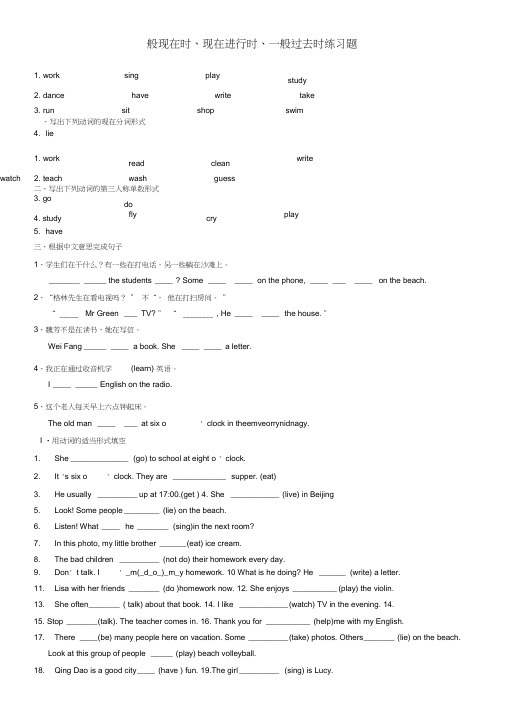
般现在时、现在进行时、一般过去时练习题、写出下列动词的现在分词形式4. lie二、写出下列动词的第三人称单数形式 5. have三、根据中文意思完成句子1、学生们在干什么?有一些在打电话,另一些躺在沙滩上。
_______ _____ the students ____ ? Some ____ ____ on the phone, ____ ___ ____ on the beach. 2、“格林先生在看电视吗? ” 不“, 他在打扫房间。
”“ _____ Mr Green ___ TV? ” “ ________ , He ____ ____ the house. ”3、魏芳不是在读书,她在写信。
Wei Fang _____ ____ a book. She ____ ____ a letter.4、我正在通过收音机学 (learn) 英语。
I ____ _____ English on the radio.5、这个老人每天早上六点钟起床。
The old man ____ ___ at six o ' clock in theemveorrynidnagy.I •用动词的适当形式填空1. She _____________ (go) to school at eight o ' clock.2. It 's six o ' clock. They are ____________ supper. (eat)3. He usually _________ up at 17:00.(get )4. She ___________ (live) in Beijing5. Look! Some people ________ (lie) on the beach.6. Listen! What ____ he _______ (sing)in the next room?7. In this photo, my little brother ______ (eat) ice cream.8. The bad children _________ (not do) their homework every day.9. Don ' t talk. I ' _m(_d_o_)_m_y homework. 10 What is he doing? He ______ (write) a letter.11. Lisa with her friends _______ (do )homework now. 12. She enjoys __________ (play) the violin.13. She often _______ ( talk) about that book. 14. I like ___________ (watch) TV in the evening. 14.15. Stop _______ (talk). The teacher comes in. 16. Thank you for __________ (help)me with my English.17. There ____ (be) many people here on vacation. Some _________ (take) photos. Others _______ (lie) on the beach. Look at this group of people _____ (play) beach volleyball.18. Qing Dao is a good city ____ (have ) fun. 19.The girl _________ (sing) is Lucy.1. worksing play study 2. dancehave write take 3. runsit shop swim 1. workread clean write2. teach wash guess watch3. go do4. study fly cry play20. I often go _______ (shop) on weekends. 21. He wants _______________ (be) an English teacher.22. Let ' s _______ (go) and ___ (play) football. 23.Can I ________ (go) and see you.24. Please _____ (be) quiet. Mother is sleeping.25. What _____ you ____ (do)? I _________ (study) maths.26. ____ y our sister ________ ( get) up early every moring?27. Don' t go outside. It is _______ (rain). 28.It is a ______ (snow) day.29. Let the boy ______ (visit) the beautiful garden. 30. Li Lei loves ________________ (tell) jokes. II. 选择填空(A)doing (B)to do (C)to do my (D)do myTV in the evening.They do their homework.(A)are watching(B)can't watching (C)don't watch III. 按要求重写下列句子( )1I want _____ homework now. ( )2. The children___football. (A)is playing (B)are playing (C)play the (D)play a( )3 . ___you ___ the blackboard? Yes, I am. (A)Can, clean (B)Are, cleaning(C)Do, clean ( )4. ______ g o and help her. (A)Let's me (B)Let's us (C)Let's (D)Let's to( )5. What are they doing? They are ______ things away.(A)put (B)putting (C)putting (D)carry( )6. Do they have a new car? Yes, ______ .(A)they are (B)they have (C)they don't (D)they do( )7. He often _________ supper at 6:00 in the evening.A. haveB. has c. is having D. is eating( )8. It ' s 6 o ' clock in the morning. He ________________ .A. get upB. gets upC. is geting upD. is getting up( )9. What are you doing? I ' m _.____ TVA. watchB. watchesC. to watchD. watching( )10. We ______________ any Chinese classes on Friday.A. are havingB. aren ' t havingC. don ' t haveD. are have( )11. Tom ______ an English class now. A. is having B. has C. having D. have( )12. Are you playing basketball? No, we ________________ .A. isn ' tB. aren ' tC. notD. don ' t( )13. Listen! The girl _____ in the room. A. sings B. singing C. is singing( )14. The boy is _________ to his teacher. A. saying B. speaking C. talking( )15. I ' m _____________ a book in the room . A. watching B. seeing C. readingD. looking)16. Where he from?A. is, comeB. do, comeC. does, comeD. is , from)17. What language do you ? A. say B. speak C. talk D. tell)18.Lo ok!The their mother do the housework.(A)are wanting (B)help (C)are helping (D)are looking)19.are the birds doing? They are singing in a tree. (A)Wh o B)What (C)How (D)Where)20.Is she ___ s omething? (A)eat (B)eating (C)eatting (D)eats)21.Look,They are swimming in the river. I want you.(A)to go with (B)go with (C)helping (D)help )22.They ( D)don't watching1. _________________________________________ We are in the same grade.(改为否定句)We in the same grade2.1 can borrow those books from our school.( 改为否定句)1 _______ borrow those books from our school3. They have nice kites.(改为否定句 )They _____ _______ nice kites4. The birds are singing in the tree.(就戈U 线部分提问 ) ___________ the birds _________ n the tree?5. The children are playing games near the house.(就戈U 线部分提问 )______________ the childre n playi ng games?6. She is closing the door now.(改成否定句 ) She ________ closing the door now7. Kate is helping her mother with housework.( 改成一般疑问句 )_____ Kate _______ her mother with housework?8. They can stay at home for two days.(改成一般疑问句 ) ______ they _____ at home for two days?9. She takes a shower at five o ' cio 戈线部分提问 ) __________________ she ________ at five o ' clock?10.1 want to sleep a little Ion ger because I ' m tifd 戈线部分提问)_______________________ want to sleep a little lon ger?一.写出下歹y 动词的过去式 is\am _________ f ly _______ plant _______ are ________ drink ________ play _______ go make doesdance worry ask taste eatdraw putthrow kick pass do studystop read can speak say tha nk buybring take二、 用be 动词的适当形式填空I. I ______ at school just now.2. He ________ at the camp last week.3. We ________ s tude nts two years ago.4. They ______ on the farm a mome nt ago.5. Yang Ling _______ eleve n years old last year.6. I __________ an En glish teacher now.7. There ________ a n apple on the plate yesterday. 8. She _________ happy yesterday.9. They _______ g lad to see each other last mon th. 10. Hele n and Nancy _______ good frien ds.II. Look, there ______ lots of grapes here. 12. There __________ a sig n on the chair on Mon day.13. There _______ s ome milk in the fridge on Sun day.14. The mobile phone ______ on the sofa yesterday eve ning.15. The little dog ___ two years old this year.16. Today ____ the second of June. Yesterday ________ the first of June. It ______ Children 'Day. All the students _____ very excited.三、 用行为动词的适当形式填空 1. He ________ (live) in Wuxi two years ago.3. We __________ (go) to school on Sun day.5. We ______ (have) a party last Hallowee n.2. The cat ________ (eat) a bird last ni ght. 4. Jim ' other _________ (plant) trees just now. 6. I _____ (watch) a carto on on Saturday.s birthday last Friday8. We all _____ (have) a good time last ni ght.7. It ______ (be) Ben9. Her father ______ (read) a n ewspaper last ni ght..10. They ________ (make) a kite a week ago.11. He _______ (jump) high on last Sports Day. 12. Hele n __________ (milk) a cow on Friday.13. Nancy ______ (pick) up oran ges on the farm last week.14. I _______ (make) a model ship with Mike yesterday.15. They _____ (play) chess in the classroom last PE lesson. 16.My mother ___________ (cook) a nice food last Spring Festival. 17. The girls ________ (sing) and _____ (dance) at the party. 18. We ________ to zoo yesterday, we ____ to the park. (go) 19. ________ y ou ____ (visit)your relatives last Spring Festival? 20. __________ he ______ (fly) a kite on Sunday? Yes, he _____ . 21.Gao Shan _____ (pull) up carrots last National Day holiday. 22.I ________ (sweep) the floor yesterday, but my mother ___ . 23. What _______ she ____ (find) in the garden last morning? She __________ (find) a beautiful butterfly. 24.She likes __________________ newspapers,but she __________ a book yesterday. (read)25.He _______ football now,but they _________ basketball just now. (play) 26. ___________ they _______ (sweep) the floor on Sunday? No, they ____ . 27. It ________ (be) the 2nd of November yesterday. Mr White ______ (go) to his office by car. 28.Gao Shan ______ (put) the book on his head a moment ago. 29. Don ' t _______ the house. Mum ______ it yesterday. (clean) 30.What _____ you ____ just now? I _ some housework. (do) 31. I want to _________ apples. But my dad _______ all of them last month. (pick) 32. ___________ he___the flowers this morning? Yes, he___. (water)33.She___(be) a pretty girl. Look,she__(do)Chinese dances. 34.The students often__(draw)some pictures in the art room.四、句型转换1. All the students were very excited.否定句:______________________________________ 一般疑问句:___________________________________肯、否回答:______________________________________2. They were in his pocket.否定句:____________________________________ 一般疑问句:_____________________________________肯、否定回答:__________________________________________3. _____________________________________ There was a car in front of the house just now. 否定句:一般疑问句:肯、否定回答:__________________________________________4.Su Hai took some photos at the Sports day.否定句:____________________________________ 一般疑问句:_____________________________________肯、否定回答:__________________________________________5. Nancy went to school early.否定句:____________________________________ 一般疑问句:_____________________________________肯、否定回答:__________________________________________6. We sang some English songs.否定句:____________________________________ 一般疑问句:_____________________________________肯、否定回答:__________________________________________7. _____________________________________ They played football in the playground. 否定句:_____ 一般疑问句:肯、否定回答:__________________________________________期末复习专项练习,包括句型转换,句子翻译,完形填空一.句型转换.:就划线部分提问1. The bank is next to the market. ___________ _______ the bank?2. I like dogs because they are very clever. ___________ ______ you like pandas?3. Jim comes from America.4. She is a shop assistant. ___________ ______ she do?5. We can see a pencil on the desk. _________ _______ you see on the desk?6. They are cleaning the room. ___________ _______ they ________ ?7. These oranges are 10 yuan. __________ _______ are these oranges?8. It was rainy yesterday. _________ _______ the weather yesterday?______ ________ the weather ____ yesterday?9. Miss Smith is her favorite teacher. __________ ________ her _______ teacher?10. Ann is tall and thin. ___________ ______ Ann ______ like?11. My grandfather is 80 years old. _________ __________ ___ your grandfather?12. I'd like a bowl of noodles. ____________ _______ _______ like?13. I saw the movie last night. __________ _______ you see last night?14. Lily went to New York city on vacation. ____________ ________ Lily _____ on vacation?15. The people were friendly. ___________ _______ the people?16. I love sports shows. ________ _____ you _________ _____ sports shows?17. John speaks English. _________ ___________ does John speak?18. She wants to buy three kilos of rice. _______ ________ rice ______ she want to buy? 改否定句19. Jack lives in a quiet place. Jack _______ _______ in a quiet place.20. I ate some apples in the morning. I _________ ______ _______ apples in the morning.21. I think you are right. I ______________ _______ you are right.22. He studied very hard last year. He ______ _______ very hard last year. 23. My teacher is drawing on the blackboard. My teacher _________ _______ on the blackboard.24. Close the door, please. ___________ ______ the door, please.25. Jim can play basketball with me.26. I have to get there before 8:00.I _______ 改一般疑问句 27. He did his homework before class. ____________ he ________ his homework before class? 28. I want to be an actor. __________ you _______ to be anactor?29. We had a good weekend. ___________ _______ _______ a good weekend?30. I'd like a cup of tea. _________ you _______ a cup of tea?31. I have to write some letters. __________ you have to _____ _______ letters?32. There are some bikes in the room. _________ ________ _______ bikes in the room?33. Sue has breakfast at 7 in the morning. _________ Sue _______ breakfast at 7 in the morning? 改同义句34. Turn right at the second turning. ___________ the second turning ____ the right.35. Where is your mother from? Where ___________ your mother ____ ______ ?36. The boys had a good time in the zoo.The boys _____ _________ in the zoo. 37. What other things do you want? What ______ ______ you want?38. She looks like her sister. The two sister __________ the _________ .39. There is an elephant under the tree. 改复数句子 There ______ _______ ____ under the tree. Jim _____ from?Jim _______ basketball with me. getthere before 8:00.。
七年级一般现在时讲解及练习(精)

七年级一般现在时讲解及练习(精)一、一般现在时的定义:(1)表示平时经常发生的事情(2)表示现在的状态如果问同学们你们每天都在干什么?你们会回答:如果问你喜欢英语吗?你会回答:这时我们会用到一般现在时二、将下列主语和谓语动词划出来例子: I do my homework in the evening.1.We have dinner at school.2.She likes pears.3.I go to school at half past six.4.He always jeans and trainers.5.Daming's uncle likes reading and he reads a lot of novels and magazines.总结:当主语为第三人称单数时,谓语动词会发生怎样的变化?三、将下列动词变为第三人称单数形式eat get tay havedo go like playbuy watch make finishlive read listen drinkswim run变法有以下几种情况:(一)一般动词(二)以s,x,sh,ch,辅音字母+o结尾的动词(三)以y结尾的动词有两种情况 A 以元音字母+y结尾的 B 以辅音字母+y结尾的(四)特殊动词have练习:将下列三个句子做主语替换练习(将主语分别替换为 he, she , my sister, Tom, they , my parents ...)1.I like reading.2 We speak Chinese.3 She goes to school every day.四、将下列句子变为一般疑问句及否定句并观察其变法I often get up at six o'clock.Do you often get up at six o'clock ?I don't often get up at six o'clock.1.We play football in the afternoon.2.I usually send emails to my friend.3.They4.Tom and Tony have breakfast at home.5.I live in China.总结:当主语为第一、二人称或第三人称复数时,一般疑问句变法:否定句变法五、将下列句子变为一般疑问句及否定句并观察其变法She wears silk shirts.Does she wear silk shirts? She doesn't wear silk shirts.1 He usually listens to music.2 She gets up early.3 My brother likes maths.4 The boy runs in the morning.总结:当主语为第三人称单数时,一般疑问句变法为:否定句变法为:综合练习:一、用所给动词的正确形式填空1 The camel __________( eat ) grass.2 They ________( live) in the desert.3 I ________( like ) playing basketball.4 My aunt usually _________( make) a cake.5 She often _________( buy ) presents for her family.6 Linda __________( sing ).7 We _________( have ) a great time.8 My friends ____________( like ) birthdays.9 My aunt and uncle usually _____________( remember ) our birthdays.二、用don't和doesn't完成句子1 Daming and Lingling ____________( not have ) lunch at home.2 Daming _________( not drink ) Coke.3 They ________________(not read ) magazines.5 Betty _______________( not watch ) TV in the evening.三、分别用do和does写出一般疑问句并回答you , go to bed, at half past ten ?Do you go to bed at half past ten ? Yes, I do. / No, I don't.2 she , like, English5 your mother , watch TV, in the evening?6 your teacher , speak English ?。
- 1、下载文档前请自行甄别文档内容的完整性,平台不提供额外的编辑、内容补充、找答案等附加服务。
- 2、"仅部分预览"的文档,不可在线预览部分如存在完整性等问题,可反馈申请退款(可完整预览的文档不适用该条件!)。
- 3、如文档侵犯您的权益,请联系客服反馈,我们会尽快为您处理(人工客服工作时间:9:00-18:30)。
----一般现在时与现在进行时的区别一般现在时表示经常性或习惯性的动作或存在的状态,或表示说话者的能力,或普遍真理。
【用法】1)经常性、习惯性的动作或存在的状态。
I go to school on foot on weekdays./ He is very busy every day.2)表示主语的特征、性格、能力、爱好等。
He can swim./ I work hard./ She likes watching TV.3)表示客观真理There are seven days in a week./ The moon moves round the earth.【标志】often (经常) ,usually (通常) ,sometimes(有时),always(总是),never(从不) , on Sundays(在星期天), every day/month/year(每一天/月/年)【针对练习】1.My father always __________(come) back from work very late.2.Where __________ you __________ (have) lunch every day?3.I often _____(get) up at half past six.4.He ____(like) eating apples.★现在进行时:【结构】 be(am, is, are)+现在分词doing写出下列动词的现在分词形式1. work___________ sing__________ play__________study__________2. dance__________ have__________ write__________take__________make__________3. run_________ sit___________shop__________swim__________begin_________get__________put__________4. lie__________(以ie结尾的动词,把ie 改为y, 再加ing )tie_________【用法】1)表示现在(说话瞬间)正在进行或发生的动作。
常和now 连用,有时用动词look!( 瞧), listen!( 听 )来表示“此时此刻”这一时间概念 ,或者使用祈使句 Don ’t? 引导的句子。
He is watching TV now.现在他正在看电视。
Look! The bus is coming.看!公共汽车来了。
Don ’t talk. We are having a class.别讲话,我们在上课。
【标志】 now( 现在 ), look!( 瞧 ),listen!( 听 ), at present(目前),at the moment(此刻),these------days( 这些天 )【针对练习】1. Who _____(sing) over there now?2. It’ s eight o’ clock. The students _____(have) an English class.3.Listen! The baby _____ (cry)in the next room.4.Don ’ t talk here. Grandparents _____(sleep).一般现在时和现在进行时强化练习一.单项选择()1. Listen! They ________ in the next room.A. singB. is singingC. are singingD. were singing()2. Lucy is always busy. She _____ only five hours every day.A. is sleepingB. will sleepC. would sleepD. sleeps()3. It’ s eight o’ clock. The students ______ an English class.A. haveB. havingC. is havingD. are having()4. ---Is your father a doctor?---Y es, he is. He _______ in Town Hospital.A. has workedB. is workingC. worksD. worked()5. On Sunday he sometimes _____ his clothes and sometimes _____ some shopping.A. wash; doB. is washing; is doingC. washes;doesD. washes; is doing()6. ---Mary, could you help me?---Wait a moment. I _____.A. read a bookB. did my homeworkC. was watching TVD. am cooking dinner.()7. ---T om _____ the piano in the room.---Please ask him to come here. A. play B. plays C. played D. is playing ()8. ---Can your father drive?---Yes, and he usually ______ to school.A. droveB. is drivingC. drivesD. has driven ()9. ---Excuse me, where is Jim?---Oh, he ______ dumplings in the kitchen. A. makes B. will make C. is making D. made()10. He said the sun ____in the east and ____in the west.A. rose; setB. rises; setsC. rises, setD. rise; sets()11. Don ’ t turn on the .TVGr andma _______ now.A. is sleepingB. will sleepC. sleptD. sleeps()12. ---______ you ______ a book?---Yes, I am.A. Do; readB. Are; readC. Are; readingD. Are; looking()13. Sometimes she _______ in the day, but now she is ________.A. works; workingB. working; workC. work; workingD. work; work()14. Jenny____ English every evening.A. has studyB. studiesC. studyD. studied ()15. Wang Mei ____ music and often ____ to music.------A. like; listenB. likes; listensC. like; are listeningD. liking ; listen( )16.---Does Tom live here? ---Yes, but he ___ here now.A. doesn ’ tliveB. hadn ’ tlivedC. Isn ’ tlivingD. will live二.用括号内所给动词的适当形式填空1.Look! The children _________(play) football on the playground. They _________(play)football every Sunday afternoon.2.Please be quiet! We __________( listen ) to the song You and Me.3. Han Meimei ___________(like) watching TV. She __________( watch) TV every evening. But now she ___________( not watch) TV . She ___________( get) ready for her final exam.4. Tom and Jim ____________(do) their homework at the moment.5. Tim usually __________ (get) up at six o’ clock.6. It’ s six o’Myclockteacher. ___________(work) in his office.7.The girl __________(like) wearing a skirt. Look! She __________(wear) a red skirt today.8.My father always __________(come) back from work very late.9.Listen! Joan __________(sing) in the classroom. She often __________ (sing) there.10.I _________(work) on a farm with my friends these days.11. She ______________ (go) to school at eight o’ clock.12.She __________(live) in Beijing.13.Look! Some people_________(lie) on the beach.14.Listen! What _____ he ________ (sing)in the next room?15.In this photo, my little brother ______(eat) ice cream.16.The bad children ___________(not do) their homework every day.17.Don ’t talk. I ’ m______(do) my homework.18.What is he doing? He _____(write) a letter .三:改写句子1. The boy is playing basketball.否定句: ____________________________一般疑问句:_________________________肯定回答:__________________________否定回答__________________________对“ The boy ”提问: ___________________________2. Mrs White is watching TV.(划线部分提问)______________________________________3. They are waiting for you at the library.(就划线部分提问)对at the library 提问 _____________________________________________对you 提问 _______________________________________________________4. They are doing housework .(分别改成一般疑问句和否定句)____________________________________________________________________________ 5. The students are cleaning the classroom . (改一般疑问句并作肯定和否定回答) ___________________________________________________________________________6. I ’ mplaying the football in the playground .(对划线部分进行提问)___________________________________________________________7.Lucy does her homework every night.------否定句: ____________________________一般疑问句:_________________________肯定回答:__________________________否定回答__________________________对“ every night提”问:___________________________8. She can eat 5 apples a day.否定句: ____________________________一般疑问句:_________________________肯定回答:__________________________否定回答__________________________ 9. There are some oranges in the bag.否定句: ____________________________一般疑问句:_________________________肯定回答:__________________________否定回答__________________________ 10. They live in America.否定句: ____________________________一般疑问句:_________________________肯定回答:__________________________否定回答__________________________对America 提问 ____________________________________11. She is cute.否定句: ____________________________一般疑问句:_________________________肯定回答:__________________________否定回答__________________________四:根据提示完成下列句子1.The students_____________(正在上英语课).2.Some girls__________________(正在跳舞).3.I_______________________(正在骑自行车)4.My mother with me_________________(正在做家务).5.______you______________( 正在看报纸吗 )?6.______she___________( 正在打扫图书馆吗 )?7. _______the boys__________(正在打篮球吗)?8.I_________________________( 想看电视 ).9.She_______________________(需要我的帮助).10.Tom____________________ (有一个笔友) .11.Helen__________________( 会讲一点英语 ).12._______his brother___________(会下棋吗)?13 . We_______________________________(每天 6:30 起床 ).14.Mr Red____________________________(在一家电视台上班).15.Tigers______________________________(非常吓人 ).16._________they ____________________(他们喜欢苹果吗)?17.Joe ___________________________________(想参演校园剧).18.Pandas_________________________________(喜欢吃树叶),but lions_________________________________________(喜欢吃肉)专业资料学习资料教育培训考试建筑装潢资料--。
